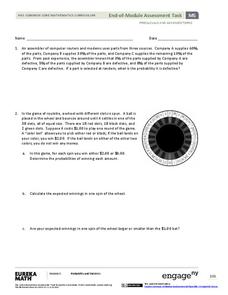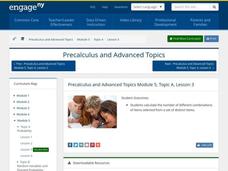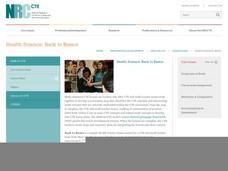Balanced Assessment
Pizza Toppings
Pupils work with a pizza shop's menu to determine the total number of pizzas possible from their ingredient list, how much the pizzas would cost, and how long it would take to eat all of them. The assessment concludes by having scholars...
EngageNY
End-of-Module Assessment Task - Precalculus (Module 5)
Give your young scholars a chance to show what they've learned from the module. The last installment of a 21-part series is an end-of-module assessment task. It covers basic and conditional probabilities, expected value, and analyzing...
EngageNY
Mid-Module Assessment Task: Pre-Calculus Module 5
Determine if any reteaching with a mid-module assessment task. The assessment covers the general multiplication rule, permutations and combinations, and probability distributions for discrete random variables.
EngageNY
Counting Rules—Combinations
Discover how combinations are different from permutations. In the third installment of a 21-part module, scholars learn how to determine combinations of objects. They learn to distinguish between situations where order is important and...
Balanced Assessment
Genetic Codes
Determine the number of possible genetic codes. Class members are challenged to determine the number of possibilities of a genetic code that is 20 bases long. They continue to explore the average lengths of broken RNA molecules.
EngageNY
Using Permutations and Combinations to Compute Probabilities
Now that we know about permutations and combinations, we can finally solve probability problems. The fourth installment of a 21-part module has future mathematicians analyzing word problems to determine whether permutations or...
EngageNY
Counting Rules—The Fundamental Counting Principle and Permutations
Count the benefits of using the resource. The second installment of a 21-part module focuses on the fundamental counting principle to determine the number of outcomes in a sample space. It formalizes concepts of permutations and...
Balanced Assessment
Batting Orders
A baseball coach has more than 700 billion decisions to make before a game even starts, and in this resource individuals calculate the number of ways a coach can make a batting lineup. The first question places nine players out of nine....
Balanced Assessment
Lotto
You can't win if you don't play! Find out how to increase your chances of winning the lottery. Scholars analyze a state lottery system for the probability of winning. They also consider different combinations of numbers and how they...
Balanced Assessment
Legos
How many ways can you arrange two six-hole Legos? Scholars practice their understanding of combinations as they investigate this question. As they create a plan, they develop a specific definition of a combination.
Teach Engineering
Edible Rovers (High School)
Design and build a rover ... then eat it? This activity has groups of two design and build Mars rovers. The teams determine what instruments they want to include with their rover and plan a budget. They calculate the cost of the body of...
Willow Tree
The Fundamental Counting Principle
How many different outfits can you make with what you have in your closet? The Fundamental Counting Principle can help you find an answer! Learners find totals using the Fundamental Counting Principle with problems that can have...
Illustrative Mathematics
But Mango Is My Favorite...
Opening up a package of fruit snacks is like a box of chocolates, you never know what you're going to get. When all the mango flavored ones are missing, learners calculate the probability that one bag versus the whole box is missing the...
Curated OER
Alex, Mel, and Chelsea Play a Game
This short probability question may look simple at first, but it is actually quite complex! Learners must understand independent events in context and must take into account several different scenarios. Use as an individual assignment...
Balanced Assessment
Initials
Learners explore the meaning of groups formed through permutations and combinations with an activity that asks individuals to determine the total number of pupils needed to guarantee that at least one pair has the same initials. They...
Balanced Assessment
Classroom Groups
How many different ways can a teacher organize a class into groups? In a grouping activity, learners explore the number of possible combinations of groups given different total participants and size criteria. They then make comparisons...
National Research Center for Career and Technical Education
Health Science: Back to Basics
This lesson focuses on unit conversion, proportions, ratios, exponents, and the metric system. Discuss measurement with your math class and demonstrate how to solve several health-science word problems. Give learners a chance to visit an...
National Council of Teachers of Mathematics
The Math Forum: Pascal's Triangle and Combinations
This page gives a description of how to use Pascal's Triangle to determine the total number of possible combinations for a sample set. Also provides a helpful example.
Wolfram Research
Wolfram Math World: Permutation
This MathWorld page gives information about permutations. Its real merit lies in the fact that there are examples for a clear understanding at various parts of the site and many links to learn detailed information about various aspects...
University of Colorado
University of Colorado: Ph Et Interactive Simulations: Plinko Probability
Drop balls through a triangular grid of pegs and see them accumulate in containers. Switch to a histogram view and compare the distribution of balls to an ideal binomial distribution. Adjust the binomial probability and develop your...
Oswego City School District
Regents Exam Prep Center: Permutations
Learn and practice permutations and finding probabilities. Teacher resource page included.
Varsity Tutors
Varsity Tutors: Hotmath: Practice Problems: Permutations, Factorials and Combinations
Thirty-one problems present a variety of practice working with permutations, factorials and combinations. They are given with each step to the solution cleverly revealed one at a time. You can work each step of the problem then click the...
Oswego City School District
Regents Exam Prep Center: Permutations and Combinations
A lesson, practice activity, and teacher resource for exploring permutations and combinations.
Thinkport Education
Thinkport: Algebra Ii: Conditional Probability
A module where students find and interpret probabilities; explore conditional probabilities, and use the conditional probability to determine if two events are independent; work with two-way tables as you analyze conditional...
























